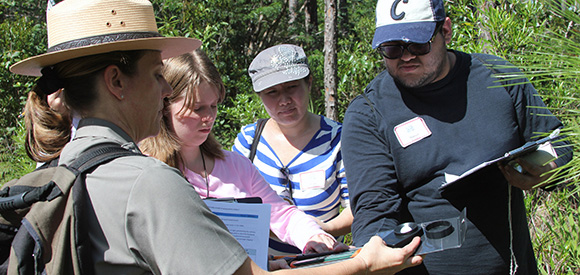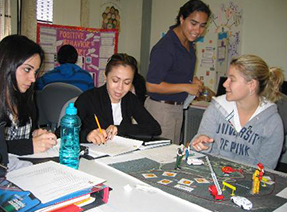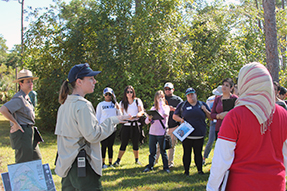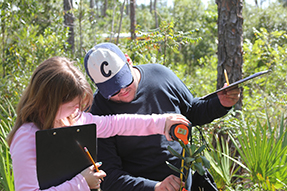The PARK Teachers program creates partnerships between National Park Service education staff and science methods faculty from local universities. Through a series of classroom and field sessions, PARK Teachers from Miami-Dade College worked to solidify their base knowledge of fire in ecosystems. PARK Teachers used inquiry-based learning techniques to answer the question, “How does fire play a role in ecosystems today?”

Educational Partnerships

The PARK Teachers program creates partnerships between National Park Service education staff and science methods faculty from local universities. Through a series of classroom and field sessions, PARK Teachers from Miami-Dade College worked to solidify their base knowledge of fire in ecosystems. Ranging from fire triangle demonstrations to experiments with fire and nutrient levels in soils to planning their own prescribed fires, pre-service teachers (college students in education who have not yet taught) from Miami-Dade College had the opportunity to gain valuable knowledge and solidify new inquiry-based techniques for teaching about fire in the classroom.
Park Field Trip

During a field trip to Everglades National Park, PARK Teachers tried their hand at inquiry-based learning techniques in the field. Staff members from Everglades environmental education program and fire management facilitated this process by providing a series of observations, data collection exercises, and group discussions for teachers to work through the question, “How does fire play a role in ecosystems today?” Instead of providing teachers with direct answers to questions, park staff provided opportunities for teachers to figure out the answers through discovery and experience in the field. Future teachers left the park armed with new ways to incorporate Everglades National Park into their curriculum, new knowledge of Everglades fire ecology, and the relevance of national parks as living classrooms.
Learning about Prescribed Fire

After visiting Everglades National Park, pre-service teachers discussed past and present pine rockland communities, pine ecosystem fragmentation outside of Everglades National Park, and values associated with the largest contiguous section of pine rockland habitat within the park. After reviewing fire’s role in the Everglades ecosystem and a brief introduction to prescribed fire tools and planning, teachers were challenged with their own fire planning and implementation. Teachers were tasked with planning their own mock prescribed fire for Everglades National Park. Using a hands-on table exercise, teachers worked to address prescribed fire objectives, weather conditions, smoke management, firing operations, firefighter and visitor safety, park resources needing protection, public values, and more. The PARK Teachers program concluded with teachers gaining an awareness of field trips, teacher workshops, and fire and educational resources available for connecting students and educators with Everglades National Park.
The goal of the PARK Teachers program is to partner scientists, park educators, and university professors to model inquiry-based and place-based learning, and to expose pre-service teachers to the resources that national parks offer to educators. The PARK Teachers program is generously funded through the National Park Foundation.
Read more information on the Everglades environmental education program.
Read more information on Everglades fire management.
Contact: Rick Anderson, Fire Management Officer; Allyson Gantt, Education and Outreach Coordinator
Email: Rick_Anderson@nps.gov; Allyson_Gantt@nps.gov
Phone: (305) 242-7853; (305) 242-7751
Last updated: December 14, 2017
